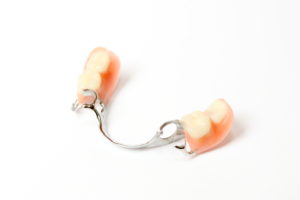 When you’ve lost a tooth or multiple teeth, you now have many options when it comes to tooth replacement. While dental bridges have been the most common restorative procedure in the past, dental implants are now widely used as well. Both offer amazing benefits, but each option may not be right for every patient. No matter which option you and your dentist decide is best for your individual needs, both options allow you to fill the missing teeth to improve your quality of life, dental health, and improve your smile.
When you’ve lost a tooth or multiple teeth, you now have many options when it comes to tooth replacement. While dental bridges have been the most common restorative procedure in the past, dental implants are now widely used as well. Both offer amazing benefits, but each option may not be right for every patient. No matter which option you and your dentist decide is best for your individual needs, both options allow you to fill the missing teeth to improve your quality of life, dental health, and improve your smile.
Benefits of a Dental Bridge
A dental bridge is used to replace one or more missing teeth but can’t be used to replace all of your teeth missing on the top or bottom jaw. Essentially, dental bridges consist of prosthetic teeth attached to metal framework. The framework is then held in place by the surrounding teeth. The bridge can be removable or cemented into place. With a bridge, you’ll resolve the missing space while giving your surrounding teeth and structures the support they need to stay in place. In addition, you’ll help protect the bone and gum from deterioration. Thanks to advancements in dentistry, the prosthetic teeth used for bridges now look more realistic for a natural-looking smile.
As effective as dental bridges are, they also come with certain setbacks. For example, oral hygiene can be more challenging and you may have certain eating restrictions. In addition, the teeth used to support the bridge are more prone to tooth decay and possible gum disease if proper hygiene isn’t maintained. All-in-all, bridges are the most affordable option upfront, but you will need to have your bridge replaced and adjusted as the years progress.
Benefits of a Dental Implant
A dental implant uses a bio-compatible titanium post, which is inserted into the jawbone to serve as a tooth root. Then, a prosthetic tooth is attached to act as a natural tooth. An implant is a permanent solution to resolve tooth loss. With an implant, you’ll have the most natural benefits in both terms of function and appearance. Since the implant is securely held in place, you care for the implants just as you care for your natural teeth. Plus, implants not only provide the support your surrounding teeth and bones need, but they also prevent and can reverse bone damage caused from tooth loss.
While dental implants are effective and have a high success rate, the implant procedure is fairly invasive and can take many months to complete depending on the amount of work that needs done. Dental implants are more expensive upfront than bridges, but in the end they are more cost effective because they will last a life time with the proper care.
Dental Bridges and Implants
At Olberding Dental, we provide both dental bridges and dental implants for tooth replacement treatment. We will evaluate your individual needs to determine which option will work best. With a customized treatment plan, we’ll restore your smile and quality of life while protecting your oral health.
